Key takeaways:
- The importance of fact-checking is emphasized as a safeguard against misinformation, fostering a well-informed public sphere.
- Key elements of fact-checking include sourcing, verification, and context, which help in understanding and sharing accurate information.
- Effective fact-checking practices involve maintaining organized checklists, engaging with experts, and staying open to new information.
- Evaluating the outcomes of fact-checking is crucial for improving techniques and understanding the impact on public perception.
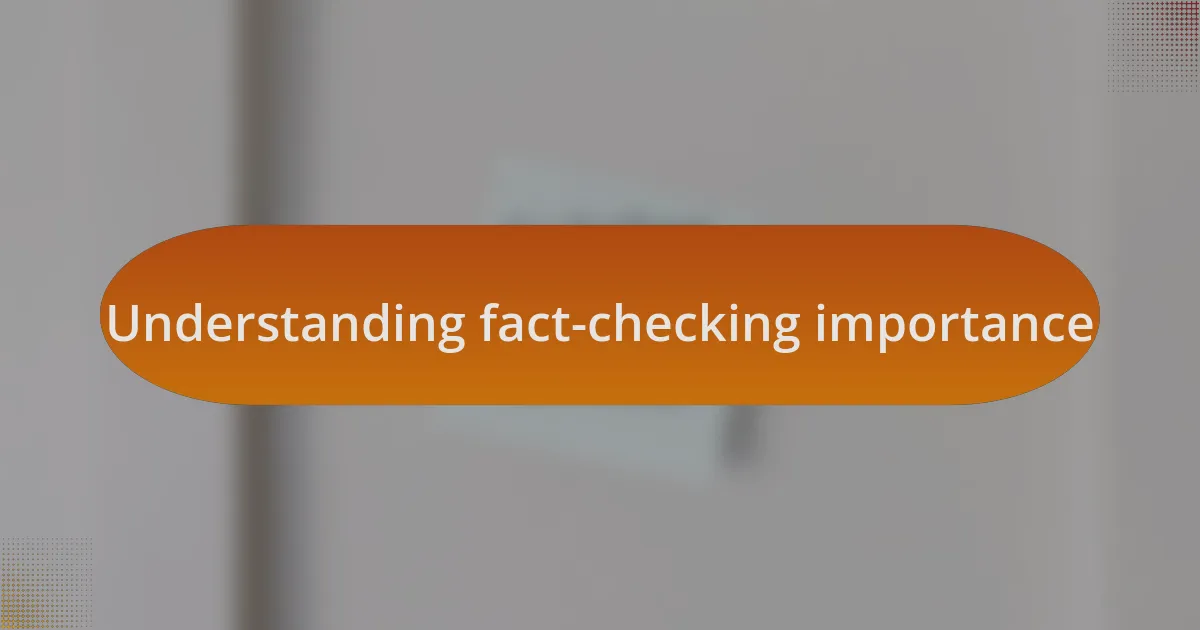
Understanding fact-checking importance
In today’s fast-paced digital age, the importance of fact-checking cannot be overstated. When I scroll through social media, I sometimes feel overwhelmed by the sheer volume of information—much of it misleading or outright false. Have you ever shared something only to find out later it was based on a unfounded claim? That feeling of embarrassment can linger, highlighting the need for vigilance in our consumption of news.
I recall a time when a viral post claimed a politician had proposed a ridiculous policy that simply wasn’t true. After a bit of digging, I discovered it was a misquote taken out of context. This experience reinforced for me how fact-checking acts as a necessary safeguard, fostering a well-informed public sphere. When we prioritize accurate information, we empower ourselves and those around us.
Moreover, fact-checking cultivates a more educated electorate. Politicians thrive on public opinion, and when we allow misinformation to spread unchecked, we’re inadvertently shaping a flawed narrative. Isn’t it our duty, as engaged citizens, to demand accuracy and truth? By actively engaging in the fact-checking process, we become contributors to a more transparent and accountable political discourse.
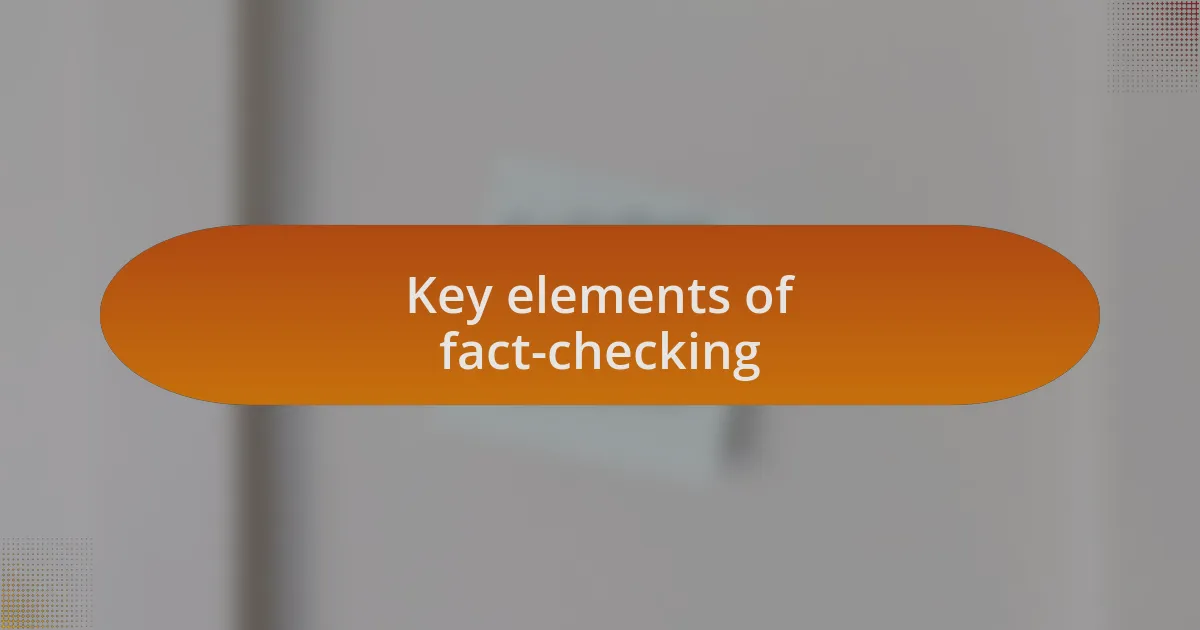
Key elements of fact-checking
When I think about the key elements of fact-checking, the first thing that comes to mind is sourcing. It’s essential to verify where the information originates. I once came across a claim that was being widely shared, asserting that a famous figure had made inflammatory comments. After tracing the source, I found it was based on a single tweet that had been radically misinterpreted. This made me realize that ensuring a credible source is foundational to accurate fact-checking.
Another critical piece is verification. It involves cross-referencing facts against multiple reliable sources. I remember reading an article that boldly stated a politician was involved in a massive scandal, but upon checking various reputable news outlets, I found no substantial evidence to support such claims. This process of verification not only prevents the spread of misinformation but also fosters a deeper understanding of complex issues.
Lastly, it’s important to assess context. Even accurate facts can mislead when presented without their proper background. I once read a statistic about public health that sounded shocking until I learned it was part of a broader trend that showed improvement over time. It reminded me how essential it is to consider the wider context before forming an opinion or sharing information. By focusing on these elements—sourcing, verification, and context—we can better navigate the murky waters of information in today’s political landscape.
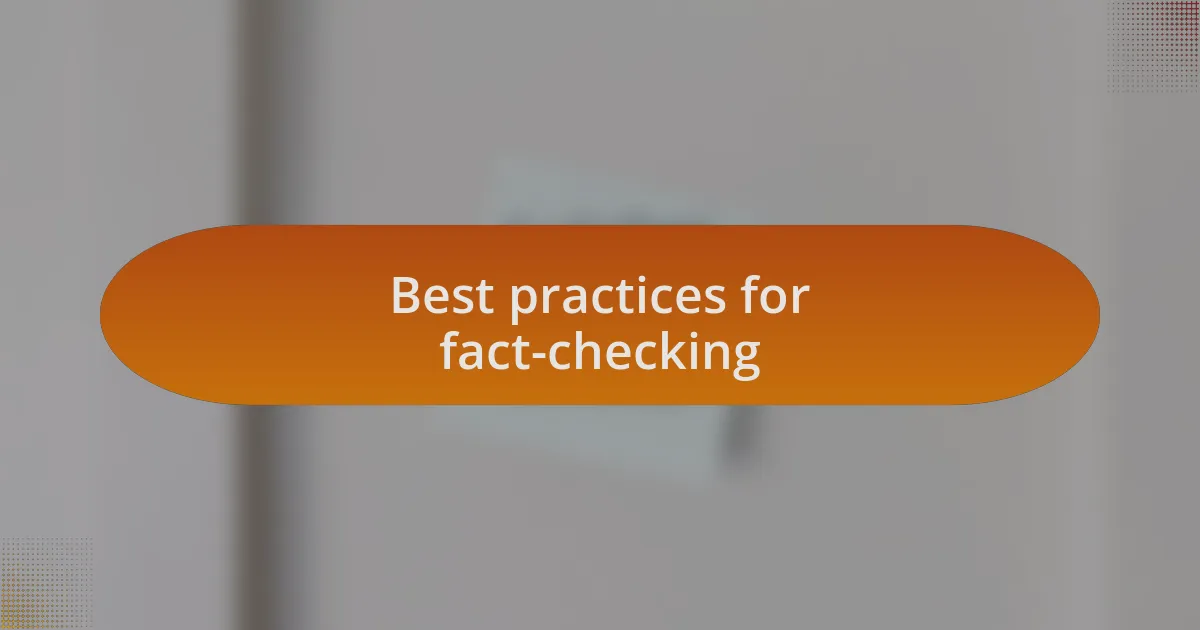
Best practices for fact-checking
When it comes to best practices for fact-checking, I have found that maintaining a checklist can be a game changer. I remember a time when I was overwhelmed by conflicting reports about a controversial legislation. Having a systematic approach to fact-checking, including checking the author’s credentials and the date of the information, helped me sort through the noise. It made me realize that being organized can save time and lead to more accurate conclusions.
Engagement with expert opinions is another effective strategy. On one occasion, I was unsure about the implications of a new policy change and reached out to a knowledgeable advocate in the field. Their insights provided clarity that helped me frame my understanding of the topic. I truly believe that asking the right people the right questions can elevate the quality of our fact-checking efforts.
Lastly, I always remind myself to stay humble in the face of new information. It’s easy to be confident in our facts until something shifts the narrative. I once confidently asserted a viewpoint based on a study, only to discover later that new research contradicted that finding. This experience taught me that fact-checking is an ongoing process, and being open to revisiting our conclusions is crucial for accuracy.
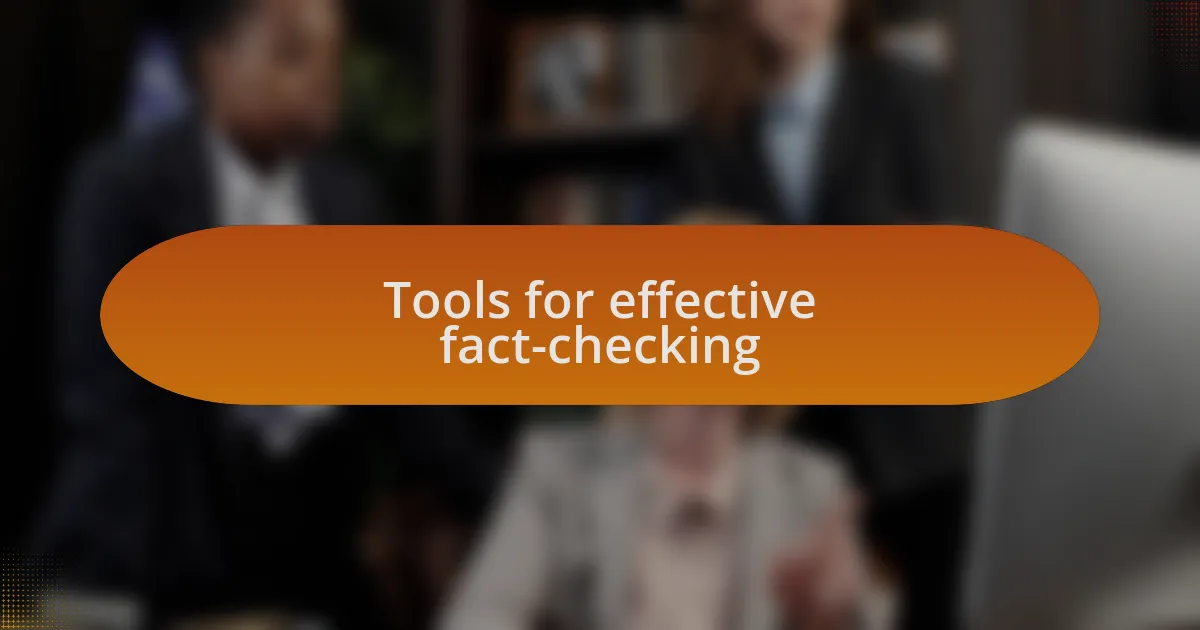
Tools for effective fact-checking
When it comes to tools for effective fact-checking, I find that utilizing dedicated fact-checking websites like Snopes or FactCheck.org can significantly enhance the research process. I remember diving into a heated debate about a viral claim on social media, and a quick search on Snopes not only debunked the myth but also provided detailed references that I could pass along to friends. Isn’t it reassuring to have an established source to verify what seems unbelievable?
Another invaluable resource in my toolbox is browser extensions that flag misleading information in real-time. I once encountered a supposed news article that seemed suspicious. Thanks to a handy tool I installed, it highlighted potential red flags and prompted me to pause and investigate further. Doesn’t it feel empowering to have support that helps you stay vigilant against misinformation?
Lastly, I can’t stress enough how important it is to keep a diverse array of sources in mind. During a recent deep dive into electoral processes, I made it a point to include perspectives from both mainstream and independent outlets. This approach not only broadened my understanding but also helped me identify biases that I might have overlooked otherwise. How often do we forget that a single narrative can obscure the full picture?
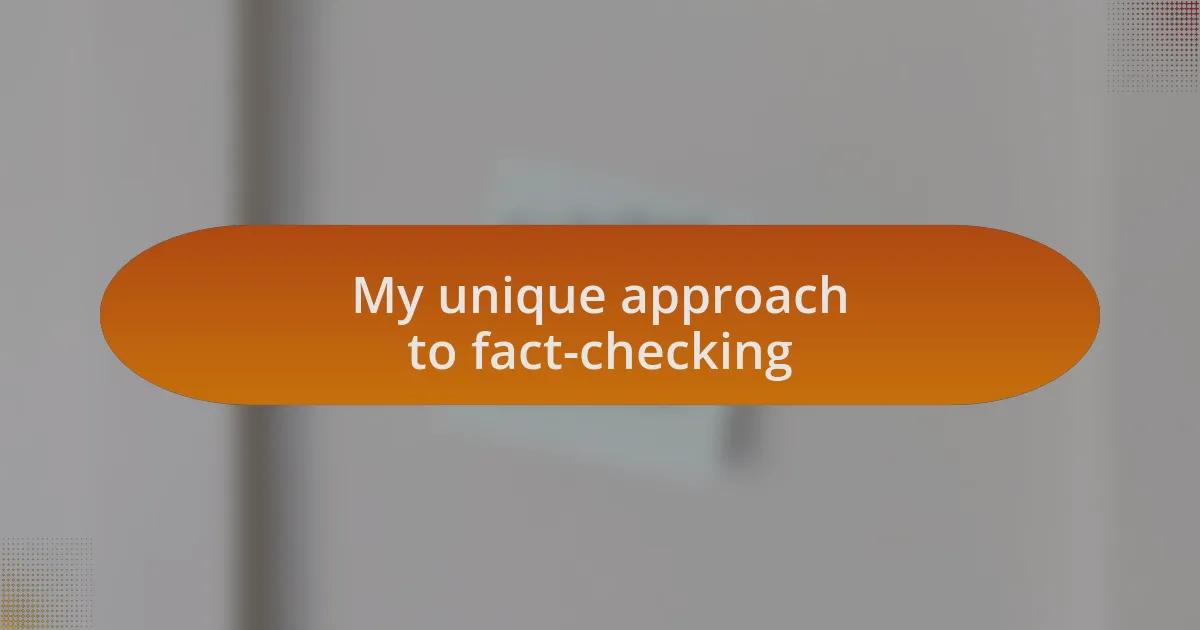
My unique approach to fact-checking
When I tackle fact-checking, I begin by prioritizing context over mere statements. I recall an incident where a popular tweet claimed a sensational event had taken place without mentioning key background details. By digging deeper, I unearthed the full story and shared it, helping others understand the nuances behind the headlines. Isn’t it fascinating how context can completely reshape our understanding?
I also engage with the community when fact-checking, often seeking insights from peers or subject matter experts. Recently, I reached out to a political analyst after questioning a claim regarding voting statistics. Their input not only clarified the situation but also fostered a collaborative spirit that made the process more enriching. How often do we realize the value of dialogue in uncovering the truth?
Moreover, I believe in the importance of transparency in my fact-checking process. I remember publishing an article that listed sources for every claim I made, allowing readers to follow along and verify for themselves. The feedback was overwhelmingly positive; people appreciated the ability to explore the information further. Isn’t it empowering when we provide our audience with the tools to think critically?
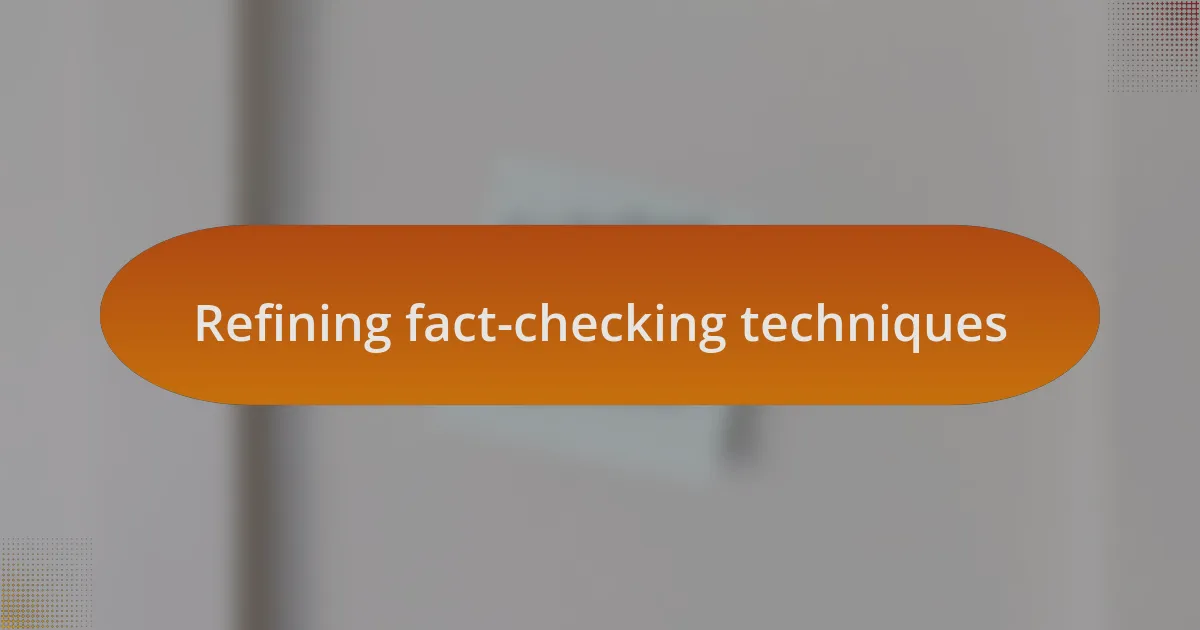
Refining fact-checking techniques
Strengthening fact-checking techniques is a continuous journey for me. For instance, I often revisit previous claims I’ve fact-checked, using updated information or newer methodologies to re-evaluate their accuracy. This reflection not only improves my process but also enhances my credibility. Have you ever noticed how evolving circumstances can shed new light on older statements?
Training myself to recognize bias within sources has also been pivotal. In one case, I encountered an article filled with emotionally charged language aimed at shaping opinions rather than presenting facts. By scrutinizing the author’s background and the publication’s history, I understood the motivations behind the narrative. It made me think: how often do we consume content without questioning the underlying biases that could distort the truth we seek?
Moreover, I regularly incorporate technology into my fact-checking methods, using tools like fact-checking databases and social media tracking. I recall a particularly challenging instance when I debunked a viral conspiracy theory. Leveraging these resources allowed me to gather solid evidence swiftly, reinforcing my findings. Isn’t it amazing how technology can elevate our commitment to accuracy in an era where misinformation spreads like wildfire?
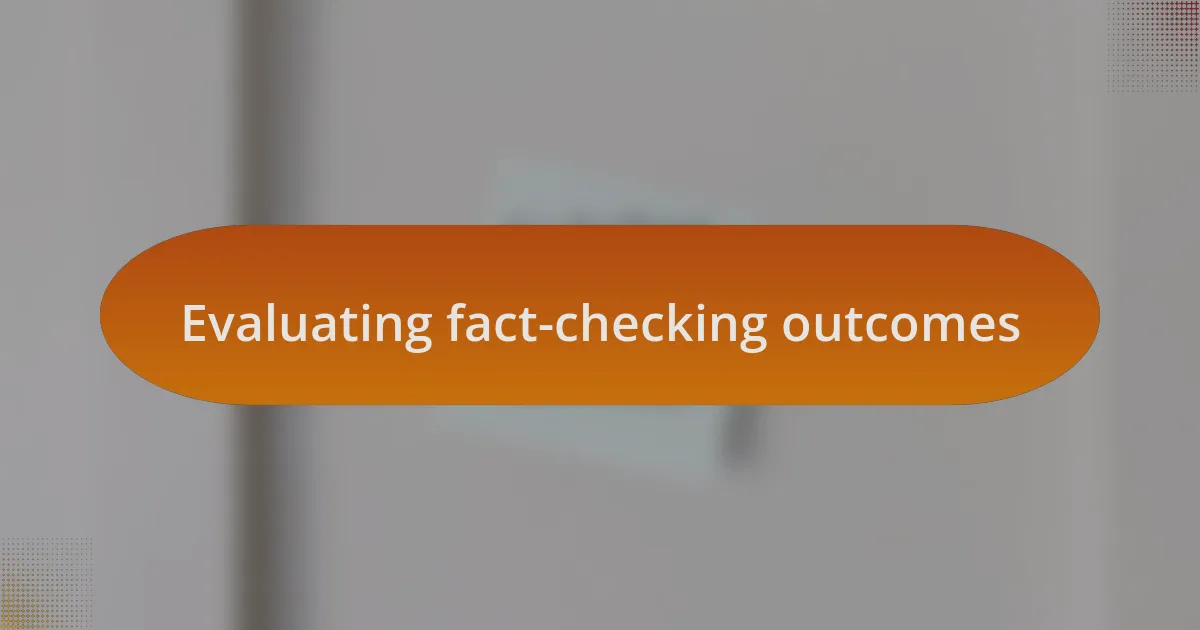
Evaluating fact-checking outcomes
Evaluating the outcomes of fact-checking can be enlightening. I often look back at claims I’ve assessed and reflect on their impact. For example, after debunking a misleading political claim, I noticed a shift in how the audience perceived the information. It left me wondering: are we effectively changing minds, or just reinforcing existing beliefs?
One particular instance stands out. After fact-checking a high-profile statement, I monitored the public discourse surrounding it. I felt a mix of satisfaction and concern as I saw both appreciation for my efforts and the persistence of some misinformation. It’s a reminder that even thorough fact-checking can sometimes feel like a drop in a vast ocean of misconceptions. How can we better engage with those who remain skeptical?
I find that tracking outcomes provides a roadmap for improvement. I analyze feedback from readers and assess engagement metrics to gauge the effectiveness of my fact-checking. This process has taught me to value both positive and negative reactions. It’s fascinating to consider: how can we leverage these insights to refine our techniques further?